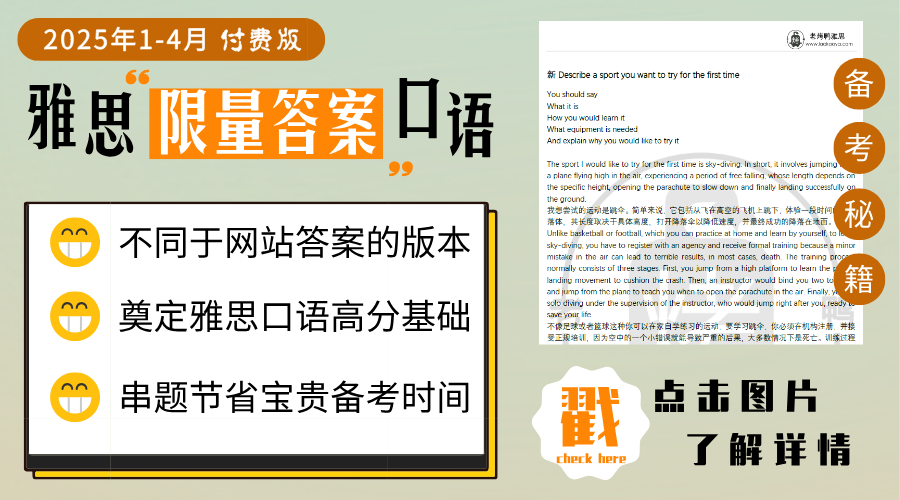剑桥雅思9Test1阅读Passage1原文翻译 William Henry Perkin 合成染料的发明者
剑桥雅思9阅读第一套题目第一篇文章的主题为合成染料的发明者William Henry Perkin。文章共分为十段,前五段按照时间顺序介绍William的人生经历,后五段将重点放在新染料上,介绍其优点所在和获得的成功。下面是具体每一段的翻译。
点击查看这篇雅思阅读中需要大家掌握的重点词汇以及对应的答案解析:
雅思真题阅读词汇 剑桥雅思9 test 1 passage 1 合成染料发明者
剑桥雅思9Test1阅读Passage1答案解析 William Henry Perkin 合成染料发明者
剑桥雅思9 Test1 Passage1阅读原文翻译
第1段
William Henry Perkin was born on March 12, 1838, in London, England. As a boy, Perkin’s curiosity prompted early interests in the arts, sciences, photography, and engineering. But it was a chance stumbling upon a run-down, yet functional, laboratory in his late grandfather’s home that solidified the young man’s enthusiasm for chemistry.
威廉·亨利·珀金(William Henry Perkin)于1838年3月12日出生于英国伦敦。珀金(Perkin)小时候的好奇心激发了他对艺术,科学,摄影和工程学的早期兴趣。但一次绊倒在他已故祖父家破旧但实用的实验室中的经历巩固了这名年轻人对化学的热爱。
第2段
As a student at the city of London School, Perkin became immersed in the study at chemistry. His talent and devotion to the subject were perceived by his teachers, Thomas Hall, who encouraged him to attend a series of lectures given by the eminent scientist Michael Faraday at the Royal Institution. Those speeches fired the young chemistry’s enthusiasm further, and he later went on to attend the Royal College of Chemistry, which he succeeded in entering in 1853, at the age of 15.
作为伦敦市立学校的学生,珀金开始沉迷于化学研究。他的老师托马斯·霍尔(Thomas Hall)意识到了他的才华与对这一学科的投入,他鼓励他文章来自老烤鸭雅思参加皇家学院著名科学家迈克尔·法拉第(Michael Faraday)的一系列讲座。这些讲座进一步激发了这名年轻化学家的热情,后来他继续就读于皇家化学学院,并于1853年在15岁的时候成功进入大学。
第3段
At the time of Perkin’s enrolment, the Royal College of Chemistry was headed by the noted German chemist August Wilhelm Hofmann. Perkin’s scientific gifts soon caught Hofmann’s attention and, within two years, he became Hofmann’s youngest assistant. Not long after that, Perkin made the scientific breakthrough that would bring him both fame and fortune.
珀金入学时,皇家化学学院由著名的德国化学家奥古斯特·威廉·霍夫曼(August Wilhelm Hofmann)领导。珀金的科学天赋很快引起了霍夫曼的注意。他在两年内成为霍夫曼最年轻的助手。此后不久,珀金取得了科学突破,这将为他带来名声和财富。
第4段
At the time, quinine was the only viable medical treatment for malaria. The drug is derived from the bark of the cinchona tree, native to South America, and by 1856, demand for the drug was surpassing the available supply. Thus, when Hofmann made some passing comments about the desirability of a synthetic substitute for quinine, it was unsurprising that his star pupil was moved to take up the challenge.
当时,奎宁是唯一有用的疟疾药物。该药物源自南美本地的金鸡纳树皮,到1856年,对该药物的需求已超过了供应量。因此,当霍夫曼(Hofmann)对奎宁合成替代品的需求发表一些评论时,他的明星学生毫不奇怪地接受了挑战。
第5段
During his vacation in 1856, Perkin spent his time in the laboratory on the top floor of his family’s house. He was attempting to manufacture quinine from aniline, an inexpensive and readily available coal tar waste product. Despite his best efforts, however, he did not end up with quinine. Instead, he produced a mysterious dark sludge. Luckily, Perkin’s scientific training and nature prompted him to investigate the substance further. Incorporating potassium dichromate and alcohol into the aniline at various stages of the experimental process, he finally produced a deep purple solution. And, proving the truth of the famous scientist Louis Pasteur’s words ‘chance favours only the prepared mind’, Perkin saw the potential of his unexpected find.
在1856年度假期间,珀金在他家房屋顶层的实验室里度过了大量时光。他正试图用苯胺生产奎宁。苯胺是一种廉价且容易获得的煤焦油废品。尽管尽了最大的努力,但是他最终都没有获得奎宁。相反,他产生了一种神秘的深色污泥。幸运的是,珀金的科学训练和天性促使他进一步研究了该物质。在实验过程的不同阶段将重铬酸钾和酒精掺入苯胺中,最终产生了深紫色溶液。珀金证明了著名科学家路易斯·巴斯德(Louis Pasteur)的话“机会只留给有准备的人”,他看到了这一意想不到的发现的潜力。
第6段
Historically, textile dyes were made from such natural sources as plants and animal excretions. Some of these, such as the glandular mucus of snails, were difficult to obtain and outrageously expensive. Indeed, the purple colour extracted from a snail was once so costly that in society at the time only the rich could afford it. Further, natural dyes tend to be muddy in hue and fade quickly. It was against this backdrop that Perkin’s discovery was made.
从历史上看,纺织染料是从植物和动物分泌物等天然来源制成的。其中一些,例如蜗牛的腺粘液,很难获得且非常昂贵。的确,从蜗牛中提取的紫色曾经非常昂贵,以至于当时的社会只有富人才能负担得起。此外,天然染料颜色混浊并很快褪色。正是在这种背景下,珀金得出了他的发现。
第7段
Perkin quickly grasped that his purple solution could be used to colour fabric, thus making it the world’s first synthetic dye. Realising the importance of this breakthrough, he lost no time in patenting it. But perhaps the most fascinating of all Perkin’s reactions to his find was his nearly instant recognition that the new dye had commercial possibilities.
珀金很快就意识到,他的紫色溶液可用于为织物着色,从而使其成为世界上第一种合成染料。意识到这一突破的重要性,他及时申请了专利。但是,也许珀金对他的发现最有意思的反应是他几乎立即意识到新染料具有商业潜力。
第8段
Perkin originally named his dye Tyrian Purple, but it later became commonly known as mauve (from the French for the plant used to make the colour violet). He asked advice of Scottish dye works owner Robert Pullar, who assured him that manufacturing the dye would be well worth it if the colour remained fast (i.e. would not fade) and the cost was relatively low. So, over the fierce objections of his mentor Hofmann, he left college to give birth to the modern chemical industry.
珀金最初将他的染料命名为Tyrian Purple,但后来被人们称为mauve(来自于法国用于制造紫罗兰色的植物)。他询问苏格兰染料厂老板罗伯特·普拉尔(Robert Pullar)的建议。他向他保证,如果颜色定型很快(即不会褪色)并且成本相对较低,那么制造这种染料就非常值得。因此,在他的导师霍夫曼(Hofmann)的强烈反对下,他离开了大学,开启了现代化学工业。
第9段
With the help of his father and brother, Perkin set up a factory not far from London. Utilising the cheap and plentiful coal tar that was an almost unlimited byproduct of London’s gas street lighting, the dye works began producing the world’s first synthetically dyed material in 1857. The company received a commercial boost from the Empress Eugenie of France, when she decided the new colour flattered her. Very soon, Mauve was the necessary shade for all the fashionable ladies in that country. Not to be outdone, England’s Queen Victoria also appeared in public wearing a mauve gown, thus making it all the rate in England as well. The dye was bold and fast, and the public clamoured for more. Perkin went back to the drawing board.
在他的父亲和兄弟的帮助下,珀金在离伦敦不远的地方建立了一家工厂。利用廉价和丰富的煤焦油(伦敦燃气街道照明几乎无限的副产品),该染料厂于1857年开始生产世界上第一种合成染料。该公司得到了法国女皇Eugenie的商业帮助。这种新颜色使她受宠若惊。很快,淡紫色就成为该国所有时尚女士的必备品。不甘落后的英格兰女王维多利亚也穿着淡紫色礼服在公众场合露面,使得该颜色在英国也流行起来。这种染料清晰而着色迅速,公众渴望更多。珀金回到实验室中。
第10段
Although Perkin’s fame was achieved and fortune assured by his first discovery, the chemist continued his research. Among other dyes he developed and introduced were aniline red (1859) and aniline black (1863) and, in the late 1860s, Perkin’s synthetic dye discoveries had outcomes far beyond the merely decorative. The dyes also became vital to medical research in many ways. For instance, they were used to stain previously invisible microbes and bacteria, allowing researchers to identify such bacilli as tuberculosis, cholera, and anthrax. Artificial dyes continue to play a crucial role today. And, in what would have been particularly pleasing to Perkin, their current use is in the search for a vaccine against malaria.
尽管珀金的首个发现为他赢取了名望和财富,但该化学家仍在继续他的研究。他开发和引进的其他染料包括苯胺红(1859年)和苯胺黑(1863年),以及19世纪60年代后期的珀金绿。珀金合成染料的发现所产生的成果远远超出了装饰性的范畴。染料在许多方面对医学研究也至关重要。例如,它们被用来标记以前看不见的微生物和细菌,从而使研究人员能够鉴定出诸如结核,霍乱和炭疽等细菌。如今,人造染料仍然扮演着至关重要的角色。而且,令珀金特别高兴的是,它们目前的用途是寻找对抗疟疾的疫苗。
剑桥雅思9Test1阅读Passage2原文翻译 Is there anybody out there 外星有生命存在吗
剑桥雅思9Test1阅读Passage3原文翻译 The history of the tortoise 乌龟的历史


